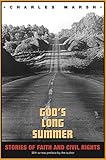God's Long Summer : Stories of Faith and Civil Rights / Charles Marsh.
Material type: TextPublisher: Princeton, NJ : Princeton University Press, [2019]Copyright date: ©2008Description: 1 online resource (296 p.) : 16 halftonesContent type:
TextPublisher: Princeton, NJ : Princeton University Press, [2019]Copyright date: ©2008Description: 1 online resource (296 p.) : 16 halftonesContent type: - 9780691130675
- 9780691206998
- African Americans -- Civil rights -- Mississippi -- History -- 20th century
- Civil rights movements -- Mississippi -- History -- 20th century
- Civil rights workers -- Religious life -- Mississippi -- History -- 20th century
- Civil rights -- Mississippi -- Religious aspects -- Christianity
- RELIGION / Christianity / History
- 305.8960730762 22
- E185.93.M6 M26 2008eb
- online - DeGruyter
- Issued also in print.
| Item type | Current library | Call number | URL | Status | Notes | Barcode | |
|---|---|---|---|---|---|---|---|
 eBook
eBook
|
Biblioteca "Angelicum" Pont. Univ. S.Tommaso d'Aquino Nuvola online | online - DeGruyter (Browse shelf(Opens below)) | Online access | Not for loan (Accesso limitato) | Accesso per gli utenti autorizzati / Access for authorized users | (dgr)9780691206998 |
Frontmatter -- CONTENTS -- PREFACE TO THE 2008 EDITION -- ABBREVIATIONS -- INTRODUCTION. With God on Our Side: Faiths in Conflict -- CHAPTER ONE. "I'm on My Way, Praise God": Mrs. Hamer's Fight for Freedom -- CHAPTER TWO. High Priest of the Anti-Civil Rights Movement: The Calling of Sam Bowers -- CHAPTER THREE. Douglas Hudgins: Theologian of the Closed Society -- CHAPTER FOUR. Inside Agitator: Ed King's Church Visits -- CHAPTER FIVE. Cleveland Sellers and the River of No Return -- CONCLUSION. Clearburning: Fragments of a Reconciling Faith -- AFTERWORD -- NOTES -- ACKNOWLEDGMENTS -- SELECTED BIBLIOGRAPHY -- INTERVIEWS -- INDEX
restricted access online access with authorization star
http://purl.org/coar/access_right/c_16ec
In the summer of 1964, the turmoil of the civil rights movement reached its peak in Mississippi, with activists across the political spectrum claiming that God was on their side in the struggle over racial justice. This was the summer when violence against blacks increased at an alarming rate and when the murder of three civil rights workers in Mississippi resulted in national media attention. Charles Marsh takes us back to this place and time, when the lives of activists on all sides of the civil rights issue converged and their images of God clashed. He weaves their voices into a gripping narrative: a Ku Klux Klansman, for example, borrows fiery language from the Bible to link attacks on blacks to his "priestly calling"; a middle-aged woman describes how the Gospel inspired her to rally other African Americans to fight peacefully for their dignity; a SNCC worker tells of harrowing encounters with angry white mobs and his pilgrimage toward a new racial spirituality called Black Power. Through these emotionally charged stories, Marsh invites us to consider the civil rights movement anew, in terms of religion as a powerful yet protean force driving social action. The book's central figures are Fannie Lou Hamer, who "worked for Jesus" in civil rights activism; Sam Bowers, the Imperial Wizard of the White Knights of the Ku Klux Klan of Mississippi; William Douglas Hudgins, an influential white Baptist pastor and unofficial theologian of the "closed society"; Ed King, a white Methodist minister and Mississippi native who campaigned to integrate Protestant congregations; and Cleveland Sellers, a SNCC staff member turned black militant. Marsh focuses on the events and religious convictions that led each person into the political upheaval of 1964. He presents an unforgettable American social landscape, one that is by turns shameful and inspiring. In conclusion, Marsh suggests that it may be possible to sift among these narratives and lay the groundwork for a new thinking about racial reconciliation and the beloved community. He maintains that the person who embraces faith's life-affirming energies will leave behind a most powerful legacy of social activism and compassion.
Issued also in print.
Mode of access: Internet via World Wide Web.
In English.
Description based on online resource; title from PDF title page (publisher's Web site, viewed 29. Jul 2021)


